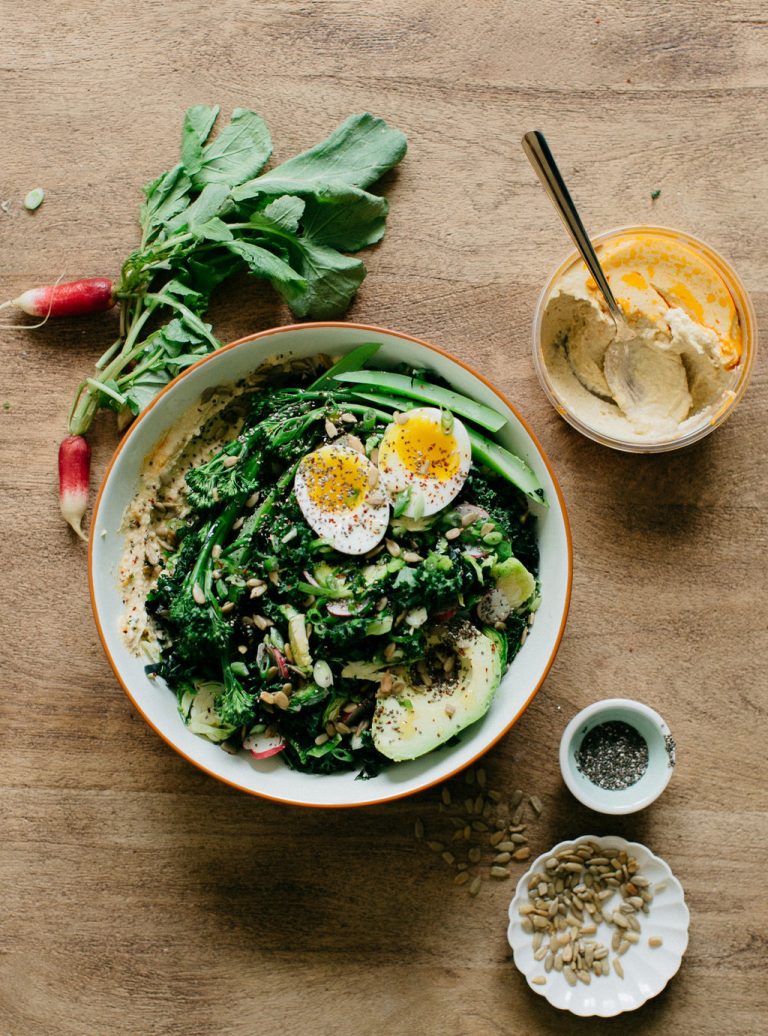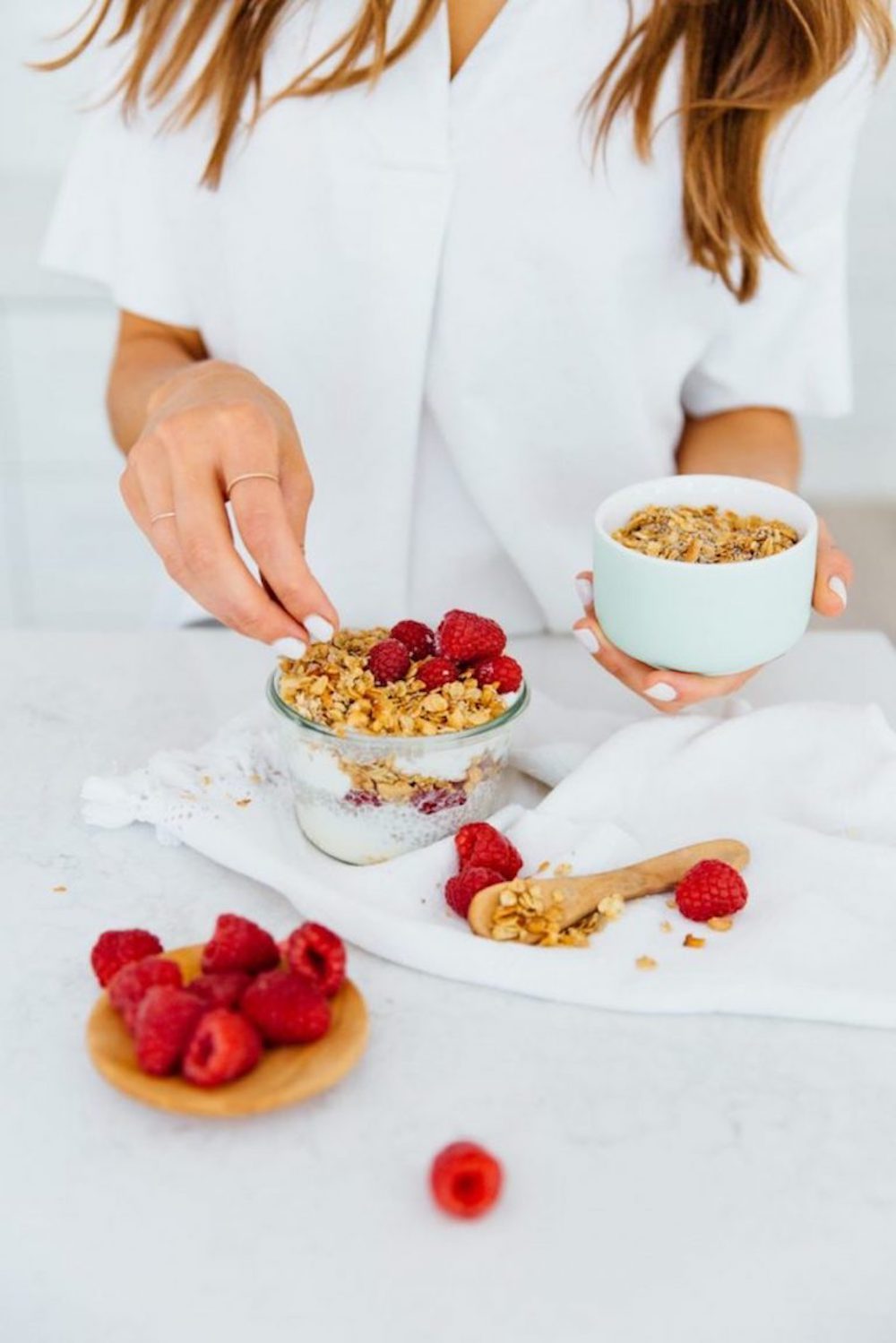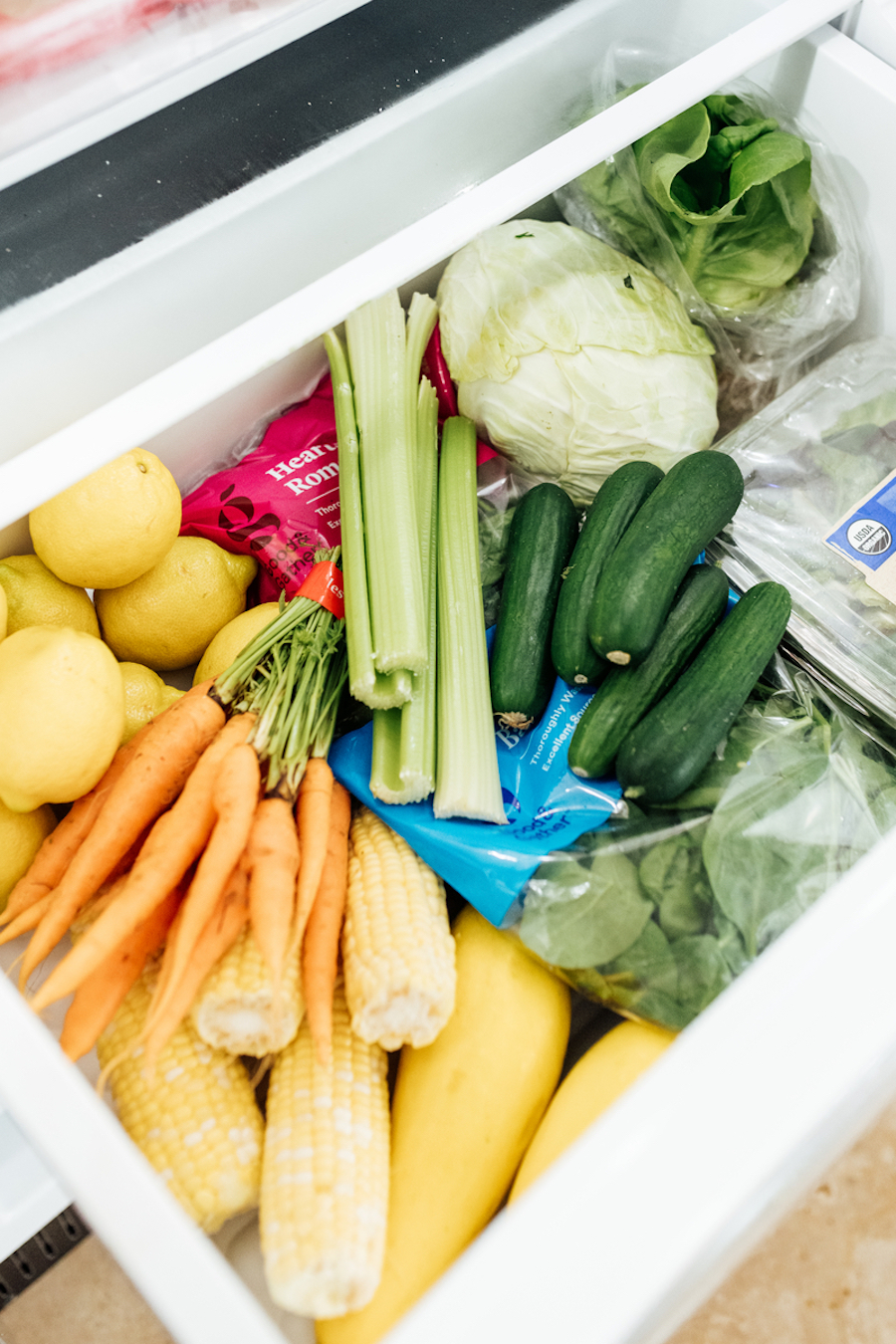Real talk: bloat is the worst. Feeling great in your body looks different for everyone, but having a swollen tummy is a real struggle that many of us face, and it can be especially frustrating during swimsuit season. When it happens, I’m inclined to ditch the fun times poolside for some stretchy pants and Netflix. But that’s not always an option, so let’s talk about how to stop feeling bloated!
The good news is, there are a few ways you can ease bloating symptoms if you’re looking to de-puff, or prevent it before it even starts, so you can feel like your best self.
In some cases, stomach bloating might be a sign of hormonal fluctuations throughout your cycle, and PMS can cause our bodies to retain excess water. Food intolerances are another common culprit, and certain foods and drinks can cause a buildup of gas in the digestive tract. However, you might be surprised that even some of your healthier habits are the reason you feel like unbuttoning your jeans.
Regardless of the cause, when we experience that uncomfortable internal pressure, we’ll do anything to get rid of it ASAP. It’s all about listening to your body and finding the tactics that work best for you and your tummy.
Download our cycle syncing planner to nourish your body throughout the month.
Scroll on for a few of our tips for how to stop feeling bloated.

Get moving.
If you are feeling bloated right after a meal, one of the best natural remedies is to get moving. Exercising helps jumpstart the digestive system, and sweating can help rid the body of excess fluids. You don’t have to go out and run 6 miles. Even a gentle walk or some light yoga can be enough to move things along in your system. Check out our editors’ favorite at-home workouts here.
Hydrate.
Bloating and swelling in the body is often a sign of dehydration. Your body might be retaining water because you haven’t had enough H2O, or you’ve had too much salt or alcohol (I’m looking at you, spicy margarita). Make sure to aim for at least 6-8 glasses a day, but not all at once. Chugging too much water too quickly can actually cause bloating, so take it slow. You can add some freshly squeezed lemon juice to help flush out your system and prevent bloating. Plus, it’s delicious and refreshing!

Focus on bloat-fighting foods.
There are a number of foods that can help fight stomach bloating and inflammation in the body. Foods that are rich in potassium like avocados, bananas, and sweet potatoes can help stabilize sodium levels. Cucumber, cantaloupe, and watermelon are made up of mostly water, making them super hydrating. Asparagus is a natural diuretic and helps flush the body of excess water. Papaya even contains a natural digestive enzyme that can help optimize digestion in your stomach. Food is nature’s best medicine.
Try a belly massage.
Turns out, stress can actually lead to bloating too. There are a few movements you can do to strengthen your mind-body connection and relieve pressure in your stomach. We tapped a specialist on the topic and shared some methods you can try at home in this article.

Cool it on the carbonated beverages.
Sorry in advance to all of the fizzy beverage lovers out there. Carbonated drinks, including some cocktails, are actually a sneaky cause of bloating because those bubbles can lead to excess gas in the digestive tract. Trade-in your La Croix for a tea or flavored water to get your afternoon fix. You can find ideas on ways to spice up your water here.
Have some tea.
Drinking herbal tea has numerous health benefits, and there are a few types that can actually help fight bloat. Ginger is known to soothe digestion, and fennel and mint help calm your system. Dandelion root is a natural diuretic and will flush your body of excess fluids. Try one of these teas when you’re feeling full after a meal, or add it as a staple in your daily routine.
Avoid salty foods.
I mentioned dehydration as one of the main causes of bloat, and often times we unknowingly consume excess sodium. One of the best ways to avoid this is by cooking food yourself, so you can better control your salt intake. I’m not here to tell you to stop going out or ordering takeout, but it’s good to be aware that restaurants can tend to over-salt your food. Focusing on natural, raw food is best, but always check nutrition labels on sauces and processed foods to make sure you’re not exceeding the recommended dose of sodium. If you’re looking to really de-bloat before an event, you can try skipping the salt altogether in your cooking, and opt for herbs and spices instead.

Cook your veggies.
Even though they’re healthy, raw vegetables like broccoli can be tough on the digestive system, which can actually lead to bloating. Try cooking your vegetables or using them in a soup to make them easier to digest.
Switch up your diet.
Our bodies are unique, and everyone can react differently to certain foods. Dairy is a common cause of bloating for many people, and a good thing to eliminate if you experience stomach discomfort. However, sometimes the issue is more complex, and others experiment with an elimination diet or a low FODMAP diet to get to the root of their tummy troubles. Luckily, there are a lot of tests and experts these days that can help uncover food sensitivities. Danielle Capalino, MSPH, RD Registered Dietitian and Nutritionist, says “FODMAPs are specific types of carbohydrates that can be difficult to digest. You can work with a Registered Dietitian to help you identify high FODMAP foods in your diet and take them out temporarily to see if it helps to relieve your symptoms. You may be surprised by the list of high FODMAP foods which include things like apples, mangoes, honey, onions, beans, and garlic.” If you are someone who’s tried everything, experimenting with a low FODMAP diet could help identify some of the bloat-causing foods in your diet.

Take probiotics.
Bloating is often a sign of gut imbalance, and probiotics are key in restoring a healthy microbiome. Probiotics can be found in foods like yogurt, kefir, kimchi, and sauerkraut, which build up healthy gut bacteria in your GI tract. You can also take probiotics in supplement form, just know that bloating is a common side effect at first as your body adjusts and regains healthy bacteria.
Skip the sweets.
Excess sugar and artificial sweeteners are a common cause of stomach discomfort. It’s always good to watch your sugar intake, even from fruit, to make sure you’re not putting too much stress on your system. Even “sugar-free” foods can contain sugar alcohols like Xylitol, Erythritol, or Sorbitol, which are known to cause bloating. Chewing gum often contains one of these ingredients, and if you’re an avid gum chewer, it might be the cause of your tummy troubles.

Fill up on fiber.
There is a huge fiber gap in the U.S. with only 5% of Americans meeting the Institute of Medicine’s recommended daily target of 25 grams for women and 38 grams for men. If you’re experiencing intestinal issues, you might not be getting the right amount of fiber in your diet. Fiber helps boost metabolism, regulate the digestive system, and balance blood sugar levels. Be careful here, too much fiber can cause bloating, and a lack of fiber can slow down digestion. You can usually get the right amount of fiber just by eating fiber-rich foods every day like leafy greens, chia or flax seeds, berries, broccoli, and more.
Get your magnesium fix.
Magnesium has a wide range of benefits, including being a powerful digestive aid and natural laxative. Boosting your magnesium levels can help with digestive discomfort and keep things regular. You can consume magnesium-rich foods like greens, avocados, black beans, and salmon, to get your daily dose, or opt to take it in supplement form.






